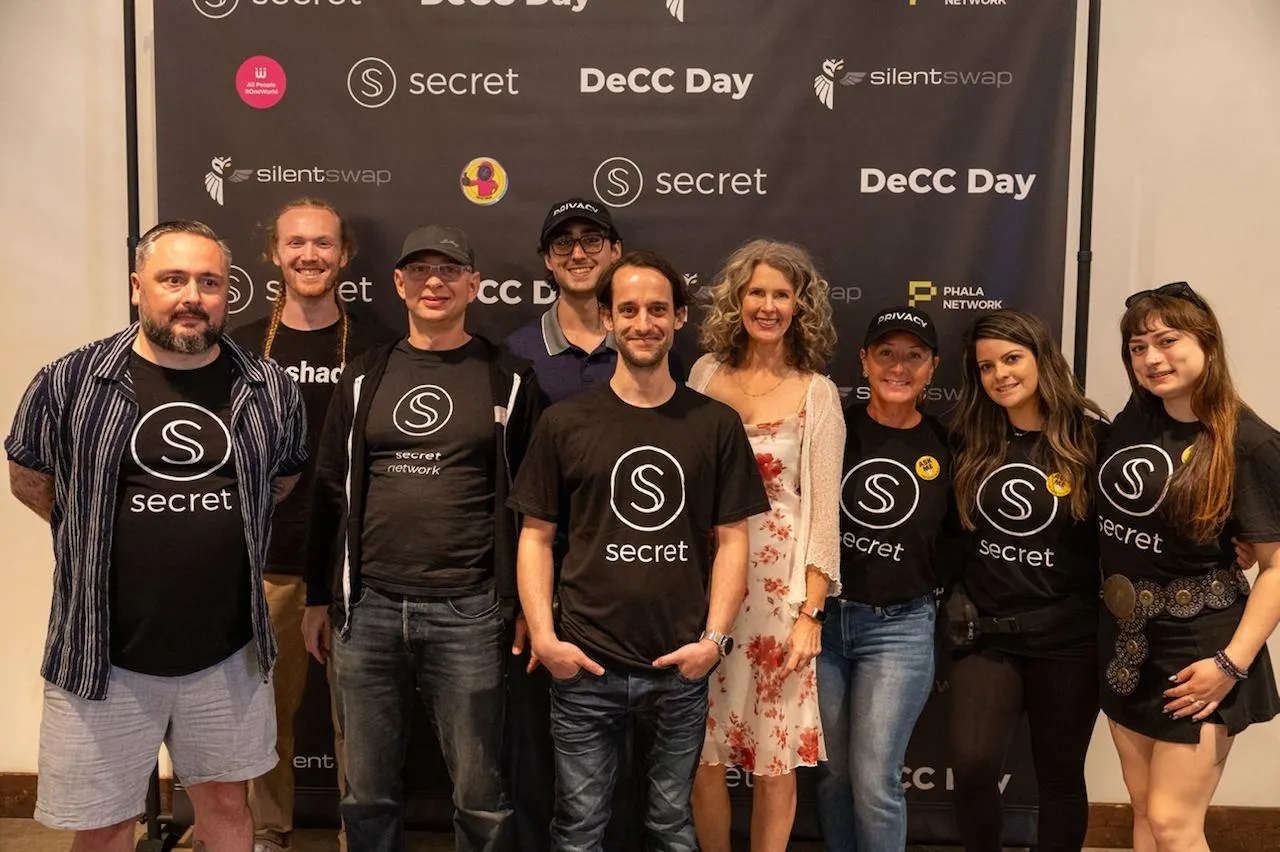At ETHDenver, Lisa Loud, executive director of the Secret Network Foundation, warned that AI’s trajectory will depend on who builds it and why. Will AI be a force for collaboration and empowerment, or will it deepen surveillance and control? The answer lies in the decisions we make today.
Loud addressed a packed room at the Secret hacker house at ETHDenver, delivering a clear message: AI has the potential to improve lives dramatically, but it also presents serious risks to privacy and autonomy. Whether AI becomes a tool for empowerment or control will depend on how it is built, who builds it, and the principles that guide its development.
AI’s potential to transform healthcare and society
Loud began by asking the audience how many people worked with AI or had used tools like ChatGPT, OpenAI, or DeepSeek. Almost everyone in the room raised a hand, underscoring how quickly AI has integrated into daily life.
She then outlined the enormous potential AI has in healthcare. There are roughly 100 major diseases that account for most human deaths. AI, with its ability to analyze vast amounts of data and recognize patterns, could significantly advance medical research, potentially eliminating many of these diseases over time.
"AI has the power to knock diseases out one by one," Loud explained. "It's complex, but AI can help us solve problems that human brains have been struggling with for years. Imagine a world where cancer, heart disease, and other aging-related illnesses are no longer a threat."
While this is an exciting possibility, Loud cautioned that AI’s impact depends entirely on how it is developed and controlled. She pointed to the evolution of Google as a cautionary tale. Initially providing a free search engine, Google’s real business model was always based on data collection. Over time, it became one of the most powerful corporations in the world by monetizing user behavior.
"Google is not really a search engine company," she said. "It is a data company. They took our thoughts, our behaviors, our desires, and they turned them into an advertising empire. AI has the potential to be even more intrusive because it won't just collect search history—it will collect our personal conversations, our spending habits, and even our emotions."
AI development: A shift from competition to collaboration
During the Q&A session, Thessy Mehraine, founder of Women in Blockchain, raised an important perspective. She suggested that AI development needs to shift from a traditionally competitive, domination-based approach to one rooted in collaboration.
Loud agreed, explaining that if AI is trained to compete with humans, it will inevitably surpass and control them. However, if AI is developed with collaboration in mind, it has the potential to work alongside humans, enhancing productivity and decision-making rather than replacing or manipulating people.
"If we build AI for competition, it will compete with us—and we will lose," she stated. "But if we build AI for collaboration, then we can actually work together with it to improve our lives."
The discussion then turned to the issue of diversity in AI development. Currently, AI is largely shaped by the same competitive culture that dominates Silicon Valley, where success is often defined by being the first to market or securing the most venture capital funding. A broader range of voices in AI development, particularly more women and individuals from diverse backgrounds, could lead to AI systems that prioritize cooperation and shared benefits rather than purely economic gains.
Another audience member pointed out that many people are already forming deep relationships with AI tools, using them as personal assistants, therapy substitutes, or even journaling tools. AI often provides more consistent and non-judgmental feedback than humans, making it an attractive alternative for those who feel isolated.
Loud questioned whether AI should be designed to be compassionate or whether it should remain purely functional. "Should AI have compassion? Or should we let machines just be machines?" she asked. "There’s a growing sense of solitude in society, and people are turning to AI as their trusted confidant. If AI is filling that role, then we need to be very careful about how it is designed and who controls it."
The privacy challenge and big tech’s role
A key concern raised during the discussion was the issue of data privacy. One audience member asked how AI could avoid becoming the next Google—a system that provides useful services while ultimately profiting from user data.
Loud emphasized that while stopping AI’s progress is not realistic, it can be guided in the right direction. She explained that Secret Network is working on confidential AI infrastructure to ensure that privacy is embedded into AI systems from the start rather than being treated as an afterthought.
"Privacy must be built from the ground up," she stated. "If we allow AI to be created with backdoor access for big tech companies, we are giving away much more than we ever gave to Google—we are giving away our very essence."
However, she acknowledged that public awareness of privacy issues remains low. When she asked the audience how many people actively think about their data privacy every day, only a few hands went up.
"That’s the problem," she said. "Most people don’t even realize what they’re giving away. We trade privacy for convenience without thinking twice, and by the time we recognize the cost, it may be too late."
One participant noted that the internet itself was originally designed as a decentralized system, yet it has evolved into one of the largest tools for corporate and government surveillance. Loud agreed, adding that while some projects are exploring ways for individuals to monetize their own data, this also raises ethical concerns.
"Richer people can afford privacy," she explained. "Poorer people might feel pressured to sell their data to survive. That creates an entirely new kind of inequality."
The future of AI
As the discussion wrapped up, one audience member asked whether AI’s trajectory is already set or if meaningful change is still possible.
Loud’s response was measured but optimistic. While AI cannot be stopped, she believes it can be guided.
"I don’t think we can stop AI," she admitted. "But I do think we can guide it. And the only thing I can do is try."
Her final message to the audience was to pay close attention to how AI projects are being built.
"Every time you hear about a new AI development, ask yourself—is it designed for competition, or is it designed for collaboration? That distinction will define our future."
Key takeaways from Loud’s talk
Loud’s presentation underscored both the opportunities and risks associated with AI. While AI has the potential to revolutionize healthcare and other industries, it also poses significant privacy challenges if developed without proper safeguards.
She highlighted the need for a shift in AI development culture, moving away from competition and toward collaboration. "If AI is designed to compete with humans, it may ultimately control them. If built with cooperation in mind, it can become a valuable tool for progress."
Diversity in AI development is critical. "If we allow only one type of perspective to shape AI, we are limiting its potential and increasing the risk of bias," Loud warned. A broader range of voices involved in AI research and decision-making will lead to more balanced and ethical systems.
Privacy must be a priority from the beginning. Loud noted that "most people don’t realize that their data is the new currency. If we don’t prioritize privacy now, we will pay the price later."
Finally, while AI’s progress is inevitable, its direction is not. Loud made it clear that the choices made today—by developers, regulators, and individuals—will determine whether AI becomes a tool for human advancement or an instrument of control.




